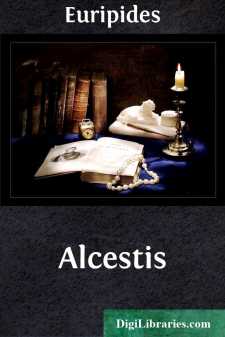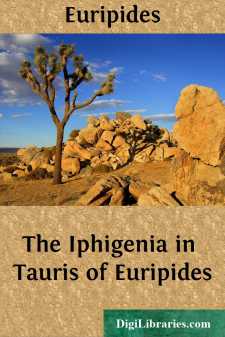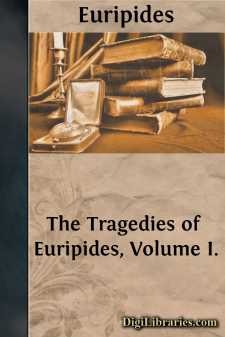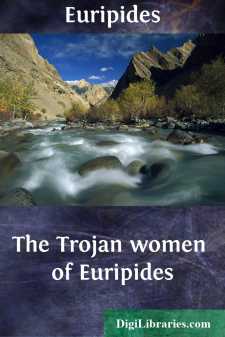Categories
- Antiques & Collectibles 13
- Architecture 36
- Art 48
- Bibles 22
- Biography & Autobiography 813
- Body, Mind & Spirit 142
- Business & Economics 28
- Children's Books 17
- Children's Fiction 14
- Computers 4
- Cooking 94
- Crafts & Hobbies 4
- Drama 346
- Education 46
- Family & Relationships 57
- Fiction 11829
- Games 19
- Gardening 17
- Health & Fitness 34
- History 1377
- House & Home 1
- Humor 147
- Juvenile Fiction 1873
- Juvenile Nonfiction 202
- Language Arts & Disciplines 88
- Law 16
- Literary Collections 686
- Literary Criticism 179
- Mathematics 13
- Medical 41
- Music 40
- Nature 179
- Non-Classifiable 1768
- Performing Arts 7
- Periodicals 1453
- Philosophy 64
- Photography 2
- Poetry 896
- Political Science 203
- Psychology 42
- Reference 154
- Religion 513
- Science 126
- Self-Help 84
- Social Science 81
- Sports & Recreation 34
- Study Aids 3
- Technology & Engineering 59
- Transportation 23
- Travel 463
- True Crime 29
Euripides
Euripides was an ancient Greek tragedian, born around 480 BC, known for his influential and often controversial plays that explored complex human emotions and societal norms. He is one of the three great tragedians of classical Athens, along with Aeschylus and Sophocles, and his works include famous tragedies such as "Medea," "The Bacchae," and "Hippolytus." Euripides' plays often featured strong female characters and questioned traditional values, making them resonate with audiences through their psychological depth and dramatic intensity.
Author's Books:
Sort by:
by:
Euripides
ALCESTIS CHARACTERS OF THE PLAY ADMÊTUS, King of Pherae in Thessaly.ALCESTIS, daughter of Pelias, his wife.PHERÊS, his father, formerly King but now in retirement.TWO CHILDREN, his son and daughter.A MANSERVANT in his house.A HANDMAID. The Hero HERACLES.The God APOLLO.THANÁTOS or DEATH.CHORUS, consisting of Elders of Pherae. "The play was first performed when Glaukînos was Archon, in the 2nd...
more...
by:
Euripides
The Iphigenia in Tauris is not in the modern sense a tragedy; it is a romantic play, beginning in a tragic atmosphere and moving through perils and escapes to a happy end. To the archaeologist the cause of this lies in the ritual on which the play is based. All Greek tragedies that we know have as their nucleus something which the Greeks called an Aition—a cause or origin. They all explain some...
more...
by:
Euripides
INTRODUCTION. Euripides, son of Mnesarchus, was born in the island of Salamis, on the day of the celebrated victory (B.C. 480). His mother, Clito, had been sent thither in company with the other Athenian women, when Attica was given up, and the ships became at once the refuge of the male population, and the national defense. Mr. Donaldson well remarks, that the patronymic form of his name, derived from...
more...
by:
Euripides
THE TROJAN WOMEN In his clear preface, Gilbert Murray says with truth that The Trojan Women, valued by the usage of the stage, is not a perfect play. "It is only the crying of one of the great wrongs of the world wrought into music." Yet it is one of the greater dramas of the elder world. In one situation, with little movement, with few figures, it flashes out a great dramatic lesson, the...
more...
by:
Euripides
APHRODITEGreat among men, and not unnamed am I,The Cyprian, in God's inmost halls on high.And wheresoe'er from Pontus to the farRed West men dwell, and see the glad day-star,And worship Me, the pious heart I bless,And wreck that life that lives in stubbornness.For that there is, even in a great God's mind,That hungereth for the praise of human kind. So runs my word; and soon the very...
more...
by:
Euripides
Introduction[1] The Electra of Euripides has the distinction of being, perhaps, the best abused, and, one might add, not the best understood, of ancient tragedies. "A singular monument of poetical, or rather unpoetical perversity;" "the very worst of all his pieces;" are, for instance, the phrases applied to it by Schlegel. Considering that he judged it by the standards of conventional...
more...







